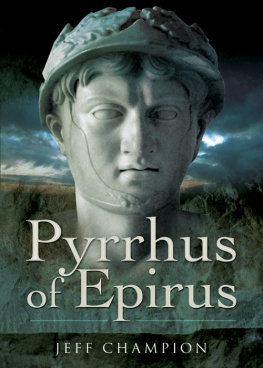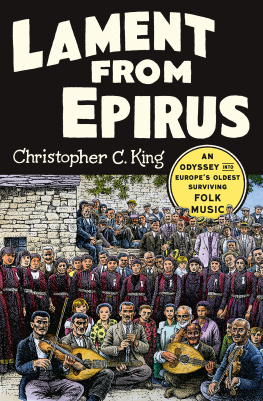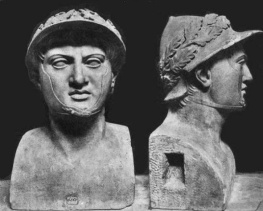
First published in Great Britain in 2009 by
Pen & Sword Military
an imprint of
Pen & Sword Books Ltd
47 Church Street
Barnsley
South Yorkshire
S70 2AS
Copyright (c) Jeff Champion
ISBN 978 1 844159 39 0
ISBN 9781844682829 (epub)
ISBN 9781844682836 (prc)
The right of Jeff Champion to be identified as Author of this Work has been asserted by him in accordance with the Copyright, Designs and Patents Act 1988.
A CIP catalogue record for this book is available from the British Library.
All rights reserved. No part of this book may be reproduced or transmitted in any form or by any means, electronic or mechanical including photocopying, recording or by any information storage and retrieval system, without permission from the Publisher in writing.
Typeset in 11/12pt Ehrhardt MT by
Pen & Sword Books Ltd, Barnsley
Printed and bound in England by
CPI
Pen & Sword Books Ltd incorporates the Imprints of Pen & Sword Aviation, Pen & Sword Maritime, Pen & Sword Military, Wharncliffe Local History, Pen and Sword Select, Pen and Sword Military Classics and Leo Cooper.
For a complete list of Pen & Sword titles please contact
PEN & SWORD BOOKS LIMITED
47 Church Street, Barnsley, South Yorkshire, S70 2AS, England
E-mail:
Website: www.pen-and-sword.co.uk
Contents
PREFACE
It is pretty generally stated by authors, that no king, either of that or the former age, was to be compared to Pyrrhus; and that there has seldom been seen, either among princes, or other illustrious men, a man of more upright life or of stricter justice; and that he had such knowledge of the military art, that though he fought against such great princes as Lysimachus, Demetrius, and Antigonus, he was never conquered. In his wars too with the Illyrians, Sicilians, Romans, and Carthaginians, he never came off inferior, but generally victorious.
Justin, 25.5
Pyrrhus, king of Epirus, was born in 319 and would die in battle in 272. He would spend many of his early years in exile, totally reliant on the patronage of foreign kings. Yet, during his life, Epirus would rise from what was considered a barbarous backwater of the Greek and Macedonian world, to a major power. At times during his reign, although never all at once, he would expand his rule to include Macedonia, Thessaly, much of central and southern Greece, Sicily and southern Italy almost to the gates of Rome. He would be the first of the Hellenistic kings to fight the Romans and the only one to defeat them in a major battle. After his death Epirus would again return to the position of a minor kingdom.
To properly understand this rapid rise and fall his career must be placed within its historical context. His life would span the period of history known as the age of the Successors. The great contemporary historian of the era, Hieronymus of Cardia, would end his history of the period at the point of Pyrrhus' death. The Successors were those generals of Alexander the Great, who would, to quote Plutarch, carve up his empire like the carcass of some great slaughtered beast. The Successors would justify their rule by the same ideology. It was a period when individuals with sufficient talent, ruthlessness and luck, could rapidly win large kingdoms and even more quickly lose them. Single events such as battles, rebellions and assassinations, could overnight destroy one dynasty and create a new one. This was the world that Pyrrhus was born into and it is in this context that his mercurial career must be viewed.
Scipio asked Hannibal who he considered to be the greatest general of all time. In the usual Roman manner he no doubt expected Hannibal to name him. Hannibal instead replied that he considered Alexander to have been the mightiest of generals, and next to him Pyrrhus, and third himself. A different version of the story has Hannibal stating that the foremost of all generals in experience and ability was Pyrrhus. This conversation, most likely, never occurred. Its constant repetition does, however, show the high regard in which Pyrrhus' generalship was held by the ancient writers. The basis of this renown probably rests on the reputation he achieved by his two great victories in battle over the Romans at Heraclea and Asculum. His reputation may also have persisted through his writings on military theory and practice. Although these works are now totally lost, they were still being read by his enemies, the Romans, over two centuries after his death. Despite the high degree of interest in Pyrrhus' career, no attempt has been made to produce a biography in English since the publication of Petros Garoufalias' second edition of his work Pyrrhus, King of Epirus in 1979. The purpose of writing this book was to provide an easily accessible narrative history of Pyrrhus life and campaigns. The first problem for anyone attempting such a work is the relative shortage of ancient sources. Although there were a number of contemporary historians for the period, and Pyrrhus reputedly wrote his own memoirs, all of their works have been lost except for a few surviving fragments. The only continuous narrative of Pyrrhus life that survives is Plutarch's biography. Although invaluable this work has it limitations, for as Plutarch readily admits he was a biographer not a historian. Plutarch confesses that:
It is not Histories that I am writing, but Lives; and in the most illustrious deeds there is not always a manifestation of virtue or vice, no, a slight thing like a phrase or a jest often makes a greater revelation of character than battles when thousands fall, or the greatest armaments, or sieges of cities.
Such a method produces obvious shortcomings for any military history based primarily on Plutarch's writings. Fortunately, his work is able to be supplemented by a number of other historians whose works include sections dealing with Pyrrhus life and campaigns.
Given the limited nature of the ancient sources, much of what I have written is open to alternative interpretations. I have, however, written what I believe to be the most likely version of events. This work is not aimed at an academic audience. I have, therefore, generally limited my endnotes to the attribution of direct quotations or to give the sources of any statistics. Anyone seriously interested in the historiographic problems concerning Pyrrhus life should consult Garoufalias work and its voluminous endnotes.
Although this book is primarily a narrative history, any course of historical events cannot be understood in isolation. There will be, therefore, a number of short discourses on topics that are relevant to the general historical context of the period. Topics covered will include: the military developments of both the Greeks and Romans in the period immediately before Pyrrhus reign; short histories of Rome's expansion into southern Italy and the conflicts between the Greeks and Carthaginians in Sicily; the character of Hellenistic kingship and the nature of the relationships between the Greek cities and the kings. This last theme is important in understanding the eventual failure of Pyrrhus expeditions to both Italy and Sicily. As shall be seen, the Greeks of Italy and Sicily probably would have taken exception to the first part of Justin's statement. The first chapter will mainly be concerned with giving the background to the wars of the Successors and how Epirus, and more particularly the Epirot royal family, were drawn into these events.
All dates in this work are BC unless otherwise noted. I have used the Latinised version of most names, believing them to be more familiar to most readers. Modern place names have generally been placed in brackets after the first use of the ancient name.
Next page









